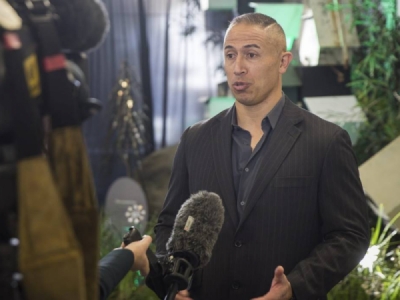
Posted on April 3, 2019
Regenerate Christchurch has spent two years and nearly $500,000 working out how the city’s eastern suburbs will adapt to sea-level rise, but is yet to come up with any options.
The rebuild agency’s boss, Ivan Iafeta, says the project is “off-track” but “not on hold”.
Regenerate, which is jointly funded by the Crown and the Christchurch City Council, has been working on the project since the 2016-17 financial year. It is charged with developing a strategy for how Southshore and South New Brighton will adapt to climate change in the short to long term, and how they will manage ongoing earthquake issues.
It met with community groups, opened a community hub in July and has gathered information. To date, Regenerate has spent $497,849 on the project, of which consultant costs were $29,916.
Last July, Regenerate said it hoped to come up with some options by last October, and have the strategy written and made available to the public in early 2019.

IAIN MCGREGOR/STUFF
Regenerate Christchurch’s Southshore and South New Brighton work relating to climate change and earthquake recovery is “off track”, according to the agency’s boss.
Meanwhile, the council will soon start on the coastal hazards chapter of its district plan, which has some overlap with Regenerate’s work.
Southshore Residents Association chairwoman Lynda Burdekin said coastal residents “bought into” Regenerate’s work and believed it would lead to results, but now felt “disillusioned”.
Everything seemed to have been on pause for more than three months and the community was receiving no information, she said.

STACY SQUIRES/STUFF
Southshore Residents Association president Lynda Burdekin says the community is disappointed and has lost trust in Regenerate.
“It’s just proving the authorities are just not doing their job. It seems to be a nod to political correctness and paperwork but actually it means nothing at all.”
The agency had “basically let us down”, she said.
Iafeta said an internal review of the project started last year to make sure it included national policy for climate change that was being developed, and feedback on how the community wanted to be engaged.

GEORGE HEARD/STUFF
Christchurch mayor Lianne Dalziel says if Regenerate does not need to do the Southshore and South New Brighton work, it could naturally transition back to the city council.
During an update to a council committee on March 7, Iafeta said the “project itself is not on hold”.
When asked if he thought there was any point having the council’s district plan work and Regenerate’s work happening at the same time, Iafeta said “those are the exact reasons I initiated the review”.
Christchurch mayor Lianne Dalziel said Regenerate still needed to advise whether a regeneration plan was required for any of the work needed in the area. A regeneration plan differs from a regeneration strategy in that it has legal powers under the Christchurch Regeneration Act, whereas a strategy has no legislative power.
If not, the work could be done by the council.
Council staff were working with Regenerate on a report setting out a way forward, which will be presented to councillors. So far Regenerate’s internal review has been shared with council staff, but not councillors.
Burdekin questioned how Regenerate or whoever took over the work would get the community involved again.
“Regenerate have the quality of staff to do the job … the people we have dealt with individually have been great, but as a whole we’re very disappointed, and our trust has just been eroded that anything practical and concrete will come of it.”
Regenerate has a history of delays in its planning work.
Its plan for the Avon River red zone, handed over to Greater Christchurch Regeneration Minister Megan Woods on March 8, was expected to be with her last November.
When Regenerate released the process it would follow to make the red zone plan, it was thought the plan could be released as soon as September 2017.
Its work on a plan for Cathedral Square has been similarly plagued by hold-ups. Regenerate once thought the ambitious plan would be ready in October 2017; it was finally released in June 2018.
The end result was expected to cost $60 million to $80m, but there was no clear indication where the bulk of the money might come from. Most of the work would not be done for up to a decade while the Christ Church Cathedral was restored.
Regenerate’s future will be discussed as part of the global settlement negotiations that will clarify Crown and council responsibilities for the rest of the city’s rebuild.
Dalziel has previously said she would like all rebuild entities to be bought into a single council-controlled urban development authority. Councillors have said they think the city has too many rebuild agencies and raised the possibility of funding cuts for Regenerate.
Concerns were raised over Regenerate’s performance from as early as April 2017, when Dalziel and then-Greater Christchurch Regeneration Minister Gerry Brownlee wrote to the agency expressing a lack of confidence in its work programme.
Source: stuff.co.nz





